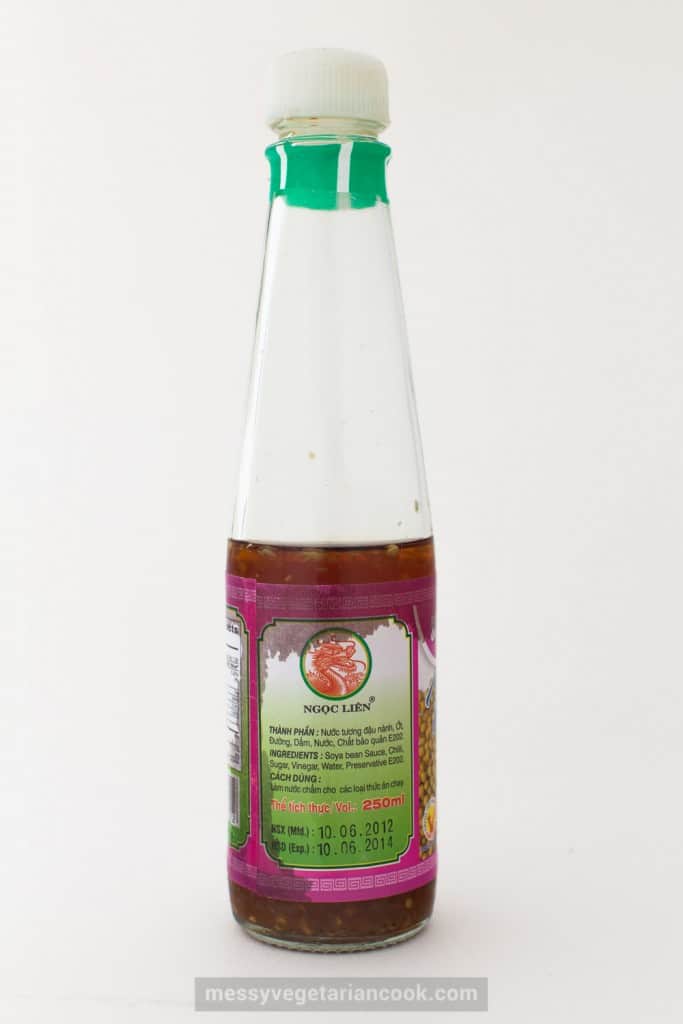Often considered vegetarian in Thai restaurants, fish sauce, oyster sauce, and shrimp paste readily feature in Thai cooking. Furthermore, even if you find a vegan restaurant that does not use shrimp paste and fish sauce, oyster sauce is still a strong possibility as many Thais consider it to be vegan.
So what are the options and how do you get around the issues?
Fish Sauce
Fish sauce, or nam plaa, is used with abandon in Thai cuisine. Luckily, since some of the country's cuisine is cooked quickly and often on the spot, it's easy to customise your meals by asking for condiments like fish sauce and oyster sauce to be left out of a dish.
But what about at home? The fermented umami punch of this ubiquitous ingredient helps to make Thai food taste, well, Thai. But of course it isn't suitable for vegans, so what are some cruelty-free alternatives?

Here is where I get on my soap box. If there’s one thing that annoys me in Thai vegan cooking it’s the many poor fish sauce substitutes that either exist pre-bottled or that recipe authors create. They are as akin to fish sauce as water is to wine.
A good vegan fish sauce is made from fermented soya beans and lots of salt. If there is sugar (although a tiny bit, if just for balance rather than sweetness, is okay), vinegar, lime juice, chilli, or any bits floating around in a clear or pink-ish liquid then throw the bottle right into the pits of hell (joking – just use it as a dipping sauce for fried things). If your recipe includes seaweed or any of the above ingredients, don’t bother. Fish sauce does not taste like any kind of seaweed. Many authors boast their recipe includes a requisite fishy flavour, meaning seaweed, but nonvegan fish sauce does not taste fishy so much as it does funky. This isn't to say those recipes won't taste good, but rather a statement they are not comparable to fish sauce, vegan or otherwise.
I have found the odd few vegetarian fish sauce varieties that are suitable (the brands you will find are likely to be Vietnamese), but they aren't always easy to come by. My favourite brand of vegan fish sauce, which is both salty and funky like the nonvegan versions, is Au Lac (pictured middle in above photo).
If you can’t find a decent bottle of vegan sauce, use a combination of light/thin soy sauce with some added salt. Fish sauce is a lot saltier than light soy sauce, so the addition of extra salt will at least approximate the briny flavour. Sometimes I add a little bit of fermented white tofu for a hint of pungency. A mix of 1 teaspoon liquid from a jar of white fermented tofu, ½ teaspoon of thin soy sauce, and a slightly rounded ⅛ teaspoon salt will give you a funkier result that still maintains the high salt content of good fish sauce.
Oyster Sauce
There are many oyster sauce alternatives, which are gloopy in texture and usually made with mushrooms. If it isn’t labelled vegetarian oyster sauce, the bottle might be labelled as mushroom stir fry sauce. Use these interchangeably with oyster sauce.
Not pictured: Lee Kum Kee now has a vegan oyster sauce alternative made using artificial shellfish flavouring rather than mushrooms. It's good.
Shrimp Paste
That gorgeous curry stall with half a dozen varieties, including an all vegetable blend, is about as likely to be vegan as a bean is likely to transform into a bat. Shrimp paste (gapi) is a fragrant fermented mass used in most curry pastes and often added to various Thai dishes for a pungent and salty kick.
You might think it’s gross, but may have inadvertently eaten it if you regularly order Thai curries in non vegetarian Thai restaurants. Always ask beforehand if the curry pastes are made with shrimp paste. Most people know to ask for no fish sauce, but shrimp paste is still a likely lurker.
There are vegan alternatives, readily (ish) available in Thailand, made from fermented bean protein. They are not dissimilar to a dark miso. In my opinion, vegan shrimp pastes made in Thailand taste more similar to Korean doenjang than to any Japanese miso. Nevertheless, miso is a good substitution, or a combination of miso and fermented bean paste. Swapping shrimp paste out for doenjang or miso will mean you still achieve a tasty end result. Seek dark bean pastes, not white miso, from your local Asian grocer if you feel like you want to spend the time making your own curry pastes.
You can also eliminate shrimp paste from curry paste recipes and just use a little extra salt instead. Most premade vegan curry pastes in Thailand are made this way.